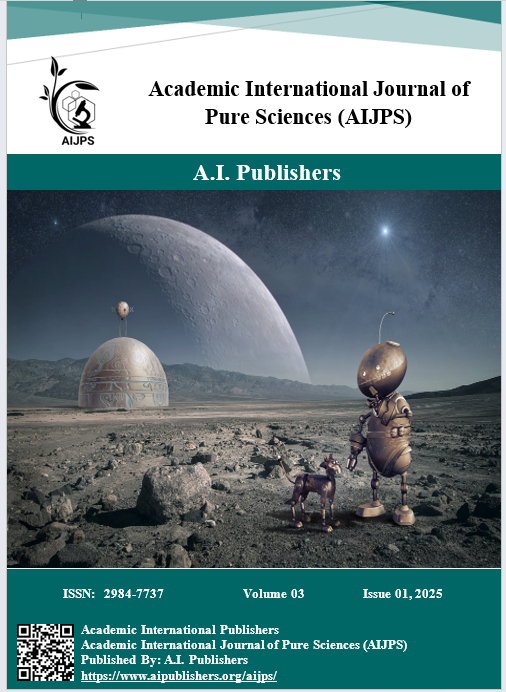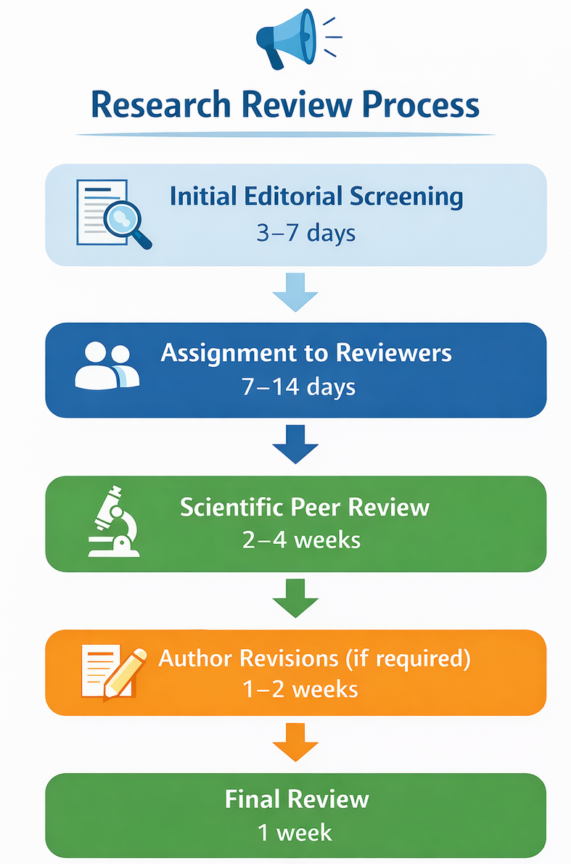Intestinal Bacterial Microbiota In Irritable Bowel Syndrome
DOI:
https://doi.org/10.59675/P111Keywords:
Intestinal, bacterial, microbiota, Irritable, Bowel, SyndromeAbstract
The digestion tube is a natural microorganism. The intestine is free of bacteria at birth, but it quickly becomes a host for numerous bacteria and regularly establishes a mutual relationship. Irritable bowel syndrome (IBS) is a common and sometimes chronic weakness of gastrointestinal function. Symptoms of irritable bowel syndrome include abdominal pain and altered bowel motility. The aetiology of this syndrome is likely to be heterogeneous.
Moreover, it is measured as a disease of instinctive-intelligence interaction; then, the microbiome is often implicated as a central player in the pathophysiology of irritable bowel syndrome through patients showing alterations in the configuration and purpose of the gut microbiota associated with healthy controls. Enterobacteriaceae faecal are observed in increased numbers of patients with irritable bowel syndrome. The presence of Escherichia coli strains in the lower intestine of humans may comprise numerous possibly pathogenic adhesive path types. The aim of this review is to summarise the available works on the microbiome influence on the pathophysiology and symptoms performance of IBS, in addition to the present results on microbiome-beleaguered demeanours aimed at this illness.
References
Herndon CC, Wang YP, Lu CL. Targeting the gut microbiota for the treatment of irritable bowel syndrome. The Kaohsiung Journal of Medical Sciences. 2020 Mar;36(3):160-70. DOI: https://doi.org/10.1002/kjm2.12154
Gerritsen J, Smidt H, Rijkers GT, de Vos WM. Intestinal microbiota in human health and disease: the impact of probiotics. Genes Nutr 2011; 6:209–40 DOI: https://doi.org/10.1007/s12263-011-0229-7
Thabane M, Marshall JK. Post-infectious irritable bowel syndrome. World J Gastroenterol. 2009; 15:3591–3596.
Roger LC, McCartney AL. Longitudinal investigation of the faecal microbiota of healthy full-term infants using fluorescence in situ hybridization and denaturing gradient gel electrophoresis. Microbiology 2010; 156:3317–28. DOI: https://doi.org/10.1099/mic.0.041913-0
Human Microbiome Project Consortium. Structure, function and diversity of the healthy human microbiome. Nature. 2012; 486:207-14. DOI: https://doi.org/10.1038/nature11234
Turnbaugh PJ, Ley RE, Mahowald MA, Magrini V, Mardis ER, Gordon JI. An obesity associated gut microbiome with increased capacity for energy harvest. Nature. 2006;444:1027-31. DOI: https://doi.org/10.1038/nature05414
Dave M, Higgins PD, Middha S, Rioux KP. The human gut microbiome: current knowledge, challenges, and future directions. Transl Res. 2012;160:246-57. DOI: https://doi.org/10.1016/j.trsl.2012.05.003
Robles-Alonso V, Guarner F. Progress in the knowledge of the intestinal human microbiota. Nutr Hosp. 2013;28:553-7.
Blaser MJ. The microbiome revolution. J Clin Invest. 2014;124:4162-5. DOI: https://doi.org/10.1172/JCI78366
Pimentel M. Review article: potential mechanisms of action of rifaximin in the management of irritable bowel syndrome with diarrhoea. Aliment Pharmacol Ther. 2016;43:37-49. DOI: https://doi.org/10.1111/apt.13437
Sommer F, Backhed F. The gut microbiota-masters of host development and physiology. Nat Rev Microbiol. 2013;11:227-38. DOI: https://doi.org/10.1038/nrmicro2974
Biasucci G, Benenati B, Morelli L, Bessi E, Boehm G. Cesarean delivery may affect the early biodiversity of intestinal bacteria. J Nutr. 2008;138:1796S–1800S DOI: https://doi.org/10.1093/jn/138.9.1796S
Mondot S, de Wouters T, Dore J, Lepage P. The human gut microbiome and its dysfunctions. Dig Dis. 2013;31:278-85. DOI: https://doi.org/10.1159/000354678
El-Salhy, M.; Hatlebakk, J.G.; Hausken, T. Diet in Irritable Bowel Syndrome (IBS): Interaction with Gut Microbiota and Gut Hormones. Nutrients 2019, 11, 1824. DOI: https://doi.org/10.3390/nu11081824
Lee, K. J. & Tack, J. (2010). Altered intestinal microbiota in irritable bowel syndrome. Neurogastroenterol Motil 22, 493–498. DOI: https://doi.org/10.1111/j.1365-2982.2010.01482.x
A. Lyra, L. Krogius-Kurikka, J. Nikkila et al., “E ¨ ffect of a multispecies probiotic supplement on quantity of irritable bowel syndrome-related intestinal microbial phylotypes,” BMC Gastroenterology, vol. 10, p. 110, 2010. DOI: https://doi.org/10.1186/1471-230X-10-110
Guarner F, Malagelada JR. Gut flora in health and disease. The lancet. 2003 Feb 8;361(9356):512-9. DOI: https://doi.org/10.1016/S0140-6736(03)12489-0
I. Posserud, A. Ersryd, and M. Simren, “Functional findings ´ in irritable bowel syndrome,” World Journal of Gastroenterology, vol. 12, no. 19, pp. 2830–2838, 2006. DOI: https://doi.org/10.3748/wjg.v12.i18.2830
Inadomi JM, Fennerty MB, Bjorkman D. Systematic review: The economic impact of irritable bowel syndrome. Alimentary Pharmacology & Therapeutics. 2003; 18:671–682. [PubMed: 14510740]. DOI: https://doi.org/10.1046/j.1365-2036.2003.t01-1-01736.x
Peery AF, Crockett SD, Barritt AS, Dellon ES, Eluri S, Gangarosa LM, … Sandler RS. Burden of gastrointestinal, liver, and pancreatic diseases in the United States. Gastroenterology. 2015; 149:1731–1741. e1733. DOI: 10.1053/j.gastro.2015.08.045 [PubMed: 26327134]. DOI: https://doi.org/10.1053/j.gastro.2015.08.045
Black CJ. Diagnosis and investigation of irritable bowel syndrome. Alimentary pharmacology & therapeutics. 2021 Dec;54:S33-43.. DOI: https://doi.org/10.1111/apt.16597
Lacy BE, Pimentel M, Brenner DM, et al. ACG Clinical Guideline: management of irritable bowel syndrome. Am J Gastroenterol. 2021; 116:17-44. DOI: https://doi.org/10.14309/ajg.0000000000001036
Prakash, S. L. Rodes, M. Coussa-Charley et al., “Gut microbiota: next frontier in understanding human health and development of biotherapeutics,” Biologics, vol. 5, pp. 71–86, 2011. DOI: https://doi.org/10.2147/BTT.S19099
Sekirov, S I.. L. Russell, L. Caetano M Antunes, and B. B. Finlay, “Gut microbiota in health and disease,” Physiological Reviews, vol. 90, no. 3, pp. 859–904, 2010. DOI: https://doi.org/10.1152/physrev.00045.2009
Carrara, S M.. Desideri, M. Azzurro et al., “Small intestine bacterial overgrowth in patients with irritable bowel syndrome,” European Review for Medical and Pharmacological Sciences, vol. 12, no. 3, pp. 197–202, 2008.
Malinen, E.T. Rinttila, K. Kajander et al., “Analysis of the ¨ fecal microbiota of irritable bowel syndrome patients and healthy controls with real-time PCR,” American Journal of Gastroenterology, vol. 100, no. 2, pp. 373–382, 2005.
Kerckhoffs,A. P.M. K. Ben-Amor, M. Samsom et al., “Molecular analysis of faecal and duodenal samples reveals significantly higher prevalence and numbers of Pseudomonas aeruginosa in irritable bowel syndrome,” Journal of Medical Microbiology, vol. 60, no. 2, pp. 236–245, 2011. DOI: https://doi.org/10.1099/jmm.0.022848-0
Park, J. M. M. Choi, Y. K. Cho et al., “Functional gastrointestinal disorders diagnosed by Rome III questionnaire in Korea,” Journal of Neurogastroenterology and Motility, vol. 17, no. 3, pp. 279–286, 2011. DOI: https://doi.org/10.5056/jnm.2011.17.3.279
Teo, M.S. Chung, L. Chitti et al., “Small bowel bacterial overgrowth is a common cause of chronic diarrhea,” Journal of Gastroenterology and Hepatology, vol. 19, no. 8, pp. 904– 909, 2004. DOI: https://doi.org/10.1111/j.1440-1746.2004.03376.x
Ghoshal, U. C. H. Park, and K. A. Gwee, “Bugs and irritable bowel syndrome: the good, the bad and the ugly,” Journal of Gastroenterology and Hepatology, vol. 25, no. 2, pp. 244–251, 2010. DOI: https://doi.org/10.1111/j.1440-1746.2009.06133.x
Simren M. and P. O. Stotzer, “Use and abuse of hydrogen ´ breath tests,” Gut, vol. 55, no. 3, pp. 297–303, 2006. DOI: https://doi.org/10.1136/gut.2005.075127
Johnsen PH, Hilpüsch F, Cavanagh JP, et al. Faecal microbiota transplantation versus placebo for moderate-to-severe irritable bowel syndrome: a double-blind, randomised, placebo-controlled, parallel-group, single-centre trial. Lancet Gastroenterol Hepatol. 2018;3:17–24. DOI: https://doi.org/10.1016/S2468-1253(17)30338-2
Thabane M. and J. K. Marshall, “Post-infectious irritable bowel syndrome,” World Journal of Gastroenterology, vol. 15, no. 29, pp. 3591–3596, 2009. DOI: https://doi.org/10.3748/wjg.15.3591
Parkes G. C., N. B. Rayment, B. N. Hudspith et al., “Distinct microbial populations exist in the mucosa-associated microbiota of sub-groups of irritable bowel syndrome,” Neurogastroenterology & Motility, vol. 24, no. 1, pp. 31–39, 2012. DOI: https://doi.org/10.1111/j.1365-2982.2011.01803.x
Malinen E., T. Rinttila, K. Kajander et al., “Analysis of the fecal microbiota of irritable bowel syndrome patients and healthy controls with real-time PCR,” The American Journal of Gastroenterology, vol. 100, no. 2, pp. 373–382, 2005.
Cammarota, G.; Ianiro, G.; Magalini, S.; Gasbarrini, A.; Gui, D. Decrease in Surgery for Clostridium difficile Infection After Starting a Program to Transplant Fecal Microbiota. Ann. Intern. Med. 2015, 163, 487–488. [Google Scholar] [CrossRef]. DOI: https://doi.org/10.7326/L15-5139
37.Britton, R.A.; Young, V.B. Interaction between the intestinal microbiota and host in Clostridium difficile colonization resistance. Trends Microbiol. 2012, 20, 313–319. [Google Scholar] [CrossRef][Green Version]. DOI: https://doi.org/10.1016/j.tim.2012.04.001
Bibbo, S.; Lopetuso, L.R.; Ianiro, G.; Di Rienzo, T.; Gasbarrini, A.; Cammarota, G. Role of microbiota and innate immunity in recurrent Clostridium difficile infection. J. Immunol. Res. 2014, 2014, 462740. [Google Scholar] [CrossRef] [PubMed][Green Version]. DOI: https://doi.org/10.1155/2014/462740
Zhuang X, Xiong L, Li L, Li M, Chen M. Alterations of gut microbiota in patients with irritable bowel syndrome: A systematic review and meta-analysis. J Gastroenterol Hepatol. 2017; 32:28–38. https://doi. org/10.1111/jgh.13471. DOI: https://doi.org/10.1111/jgh.13471
Malinen E, et al. Analysis of the fecal microbiota of irritable bowel syndrome patients and healthy controls with real-time PCR. Am J Gastroenterol. 2005; 100:373–82. https://doi.org/10.1111/j.1572-0241. 2005.40312. DOI: https://doi.org/10.1111/j.1572-0241.2005.40312.x
Tap, J. et al. Identification of an Intestinal Microbiota Signature Associated with Severity of Irritable Bowel Syndrome. Gastroenterology 152, 111–123 e118, doi:https://doi.org/10.1053/j.gastro.2016.09.049 (2017). DOI: https://doi.org/10.1053/j.gastro.2016.09.049









